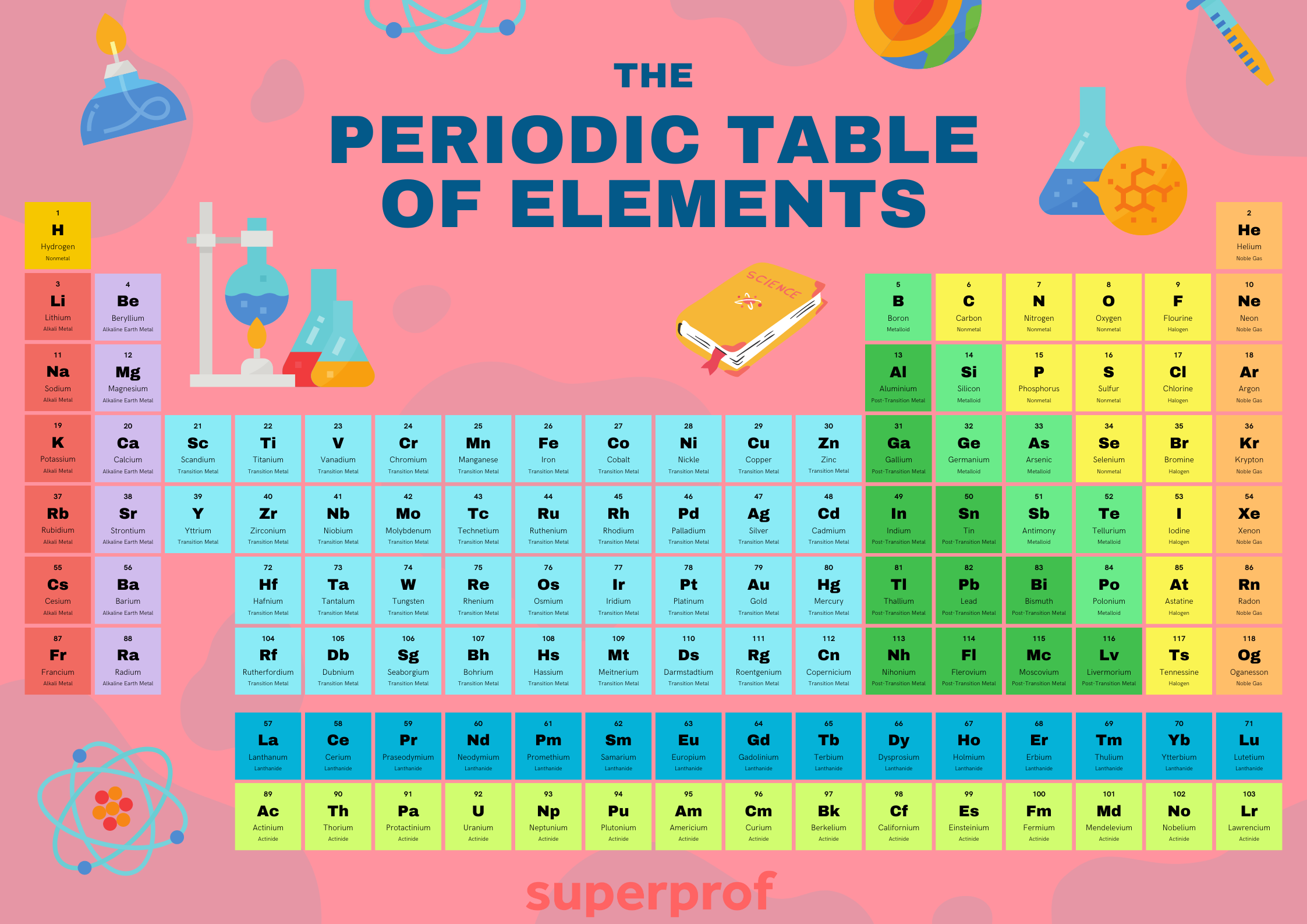When we talk about the subject of chemistry, all we can picture is a lab with a lot of tubes filled with strange liquids and lab scientists wearing eye protection glasses and white coats. Nothing makes sense until you want it to. Chemistry is one of the most hated subjects for school-goers, but only until your chemistry teacher successfully explains to you its importance.

Famous Chemists & Their Inventions
Before we proceed with the names of great chemistry scientists, let us rewind a little and see what the inventions in chemistry are by the scientists and known chemists.
- Antoine Lavoisier – Known as the Father of Modern Chemistry; established the law of conservation of mass.
- Dmitri Mendeleev – Created the Periodic Table of Elements, organizing elements by atomic weight and properties.
- John Dalton – Developed the Atomic Theory, proposing that all matter is made up of indivisible atoms.
- Marie Curie – Discovered the radioactive elements polonium and radium; first person to win two Nobel Prizes.
- Robert Boyle – Formulated Boyle’s Law, relating gas pressure and volume.
- Linus Pauling – Explained chemical bonding and molecular structures using quantum mechanics.
- Joseph Priestley – Discovered oxygen and studied gases, contributing to early chemical theory.
- Amedeo Avogadro – Proposed Avogadro’s Law, linking gas volume with number of molecules.
- Gilbert N. Lewis – Introduced the Lewis structure model of chemical bonding.
- Rosalind Franklin – Provided X-ray diffraction images critical to discovering the structure of DNA.
Louis Pasteur (1822-1895)
A French chemist and microbiologist renowned for his discoveries of the principles of vaccination, microbial fermentation, and pasteurization. Pasteur's most famous invention is pasteurization, a process of heating liquids to kill harmful bacteria.
Pasteur also developed the first vaccines for rabies and anthrax, saving countless lives. His work laid the foundation for modern vaccination programs, which have eradicated or controlled numerous infectious diseases.
He is considered one of the three main founders of bacteriology.
James Watson (1928-present)
An American molecular biologist, geneticist, and zoologist, best known for co-discovering the structure of DNA in 1953 with Francis Crick.
James Watson is an American molecular biologist and geneticist best known for his co-discovery of the double helix structure of DNA in 1953, along with Francis Crick. This groundbreaking discovery revolutionized our understanding of genetics and paved the way for modern molecular biology.
🏆 Nobel Prize in Physiology or Medicine In 1962, Watson, Crick, and Maurice Wilkins were jointly awarded the Nobel Prize in Physiology or Medicine for their discovery of the DNA structure. This prestigious award recognized the profound impact of their work on the field of biology.
Learn more about famous scientists with a private chemistry teacher on Superprof!
Antoine Lavoisier (Antoine-Laurent de Lavoisier)
Lavoisier transformed chemistry from a qualitative to a quantitative science by introducing precise measurements and experiments. He developed a system of chemical nomenclature that is still used today and helped to establish the metric system.
Lavoisier is often considered the "Father of Modern Chemistry" for his groundbreaking contributions to the field. He revolutionized the understanding of combustion, identified and named oxygen, and developed the law of conservation of mass
His contribution is remembered for both chemistry and biology. Some of his popular works include-
- Oxygen theory
- Nomenclature of chemicals
- Providing the concepts of stoichiometry
- The chemical revolution.
Nothing is lost, nothing is created, everything is transformed.
Antoine Lavoisier
Dmitri Mendeleev
Many researchers have tried to present the elements and define their periodicity, including John Newlands, and Lothar Meyer. Until 1867, when Mendeleev was preparing a chemistry textbook, he made periodic tables his most valuable discoveries.
Discover the best chemistry class online so you can learn more about this fascinating science.
The periodic table currently contains 118 elements, ranging from hydrogen (atomic number 1) to oganesson (atomic number 118).

Linus Carl Pauling
He is an American-based chemist, chemical engineer, and biochemist. He won Nobel prizes for his chemistry work.
🏆 Two Nobel Prizes: He received the Nobel Prize in Chemistry in 1954 for his research on the nature of the chemical bond and its application to the elucidation of the structure of complex substances. He also received the Nobel Peace Prize in 1962 for his efforts to promote nuclear disarmament.
Chemical Bonding: He developed the concept of electronegativity, which helped explain the strength and polarity of chemical bonds.
Molecular Structure: He used X-ray crystallography to determine the structures of complex molecules, such as proteins and DNA.
Quantum Chemistry: He applied quantum mechanics to the study of chemical bonding and reactions.
Nuclear Chemistry: He investigated the structure of the atomic nucleus and the nature of nuclear forces
John Dalton
Besides being a renowned chemist, he was also a popular microbiologist and meteorologist. He identified color blindness.
Law of Partial Pressures: Dalton also formulated the law of partial pressures, which states that the total pressure of a mixture of gases is equal to the sum of the partial pressures of the individual gases. This law is important for understanding the behavior of gases in mixtures
Dalton was also the first person to describe color blindness, a condition that he suffered from. He published his observations on color blindness in 1794, and the condition is now known as Daltonism in his honor.
Atomic Theory: John Dalton's most significant contribution to chemistry was his atomic theory, which he proposed in 1803.
This theory states that all matter is composed of tiny, indivisible particles called atoms. It also proposed that atoms of the same element are identical in mass and properties and that atoms of different elements combine in simple whole-number ratios to form compounds.
Marie Curie (1867-1934)
She was the first lady who won Nobel Prizes for physics and then chemistry. She is known for her discoveries of radioactivity.
There is a lot to learn in chemistry, which makes the subject a versatile phenomenon. Further, with the works of renowned chemists, the subject has been given a proper shape, and it still holds a lot of discoverable facts, which is why it is one of the most indulging subjects as well.
Nothing in life is to be feared; it is only to be understood.
Marie Curie
What is Organic Chemistry?
As the term organic is used, one can easily understand the involvement of living organisms. However, the term organic in chemistry deals with carbon compounds. Organic chemistry can be defined as the study of carbon, as well as the study of chemistry in life. It is the study of chemicals in living organisms.
Famous Organic Chemists
- Robert Robinson (1886-1975): Nobel laureate known for his work on the structure of natural products like strychnine and penicillin.
- Dorothy Crowfoot Hodgkin (1910-1994): Nobel laureate who pioneered X-ray crystallography to determine the structures of complex molecules like vitamin B12 and penicillin.
- Linus Pauling (1901-1994): Nobel laureate in chemistry and peace, known for his work on the nature of the chemical bond and the structure of proteins.
Find chemistry classes here on Superprof, and learn about Chemistry from passionate teachers.
What is Inorganic Chemistry?
The study of chemical compounds that do not have a carbon-hydrogen bond can be defined as inorganic chemistry. There are many known inorganic compounds.
Inorganic chemistry is a branch of chemistry that focuses on the study of non-carbon compounds, including metals, minerals, and organometallic compounds. It explores the properties, behavior, and reactions of these substances, which play a crucial role in various fields, including materials science, catalysis, and energy storage.
Inorganic chemistry can be classified as:
- Acids: When dissolved in water, these are the compounds that produce H+ ions. Most acids can be dissolved in water and are corrosive.
- Bases: When dissolved in water, bases are the compounds that produce hydroxyl ions or OH-. Some common bases are calcium hydroxide, potassium hydroxide, caustic lime, etc.
- Salts: The compounds that are produced as a reaction between an acid and the base. Thus, they can be described as the ionic compound which has been formed by contradictory charged ions.
- Oxides: These are compounds containing at least one oxygen atom combined with another element.
Famous Inorganic Chemists
- Alfred Werner (1866-1919): A Swiss chemist who is considered the father of coordination chemistry. He was awarded the Nobel Prize in Chemistry in 1913 for his work on the structure of complex inorganic compounds.
- Linus Pauling (1901-1994): An American chemist who made significant contributions to inorganic chemistry, quantum chemistry, and molecular biology. He was awarded the Nobel Prize in Chemistry in 1954 for his work on the nature of the chemical bond and the structure of proteins.
- Henry Taube (1915-2005): A Canadian chemist who is known for his work on the mechanisms of electron transfer reactions in inorganic compounds. He was awarded the Nobel Prize in Chemistry in 1983.
Famous Chemistry Scientists From India
India has a rich history of great experts, researchers, inventors, and scholars. In addition to these, many popular chemistry scientists made the country proud. Find the top names of a famous chemistry scientist in India-
Prafulla Chandra Roy
He is a popular academician, chemist, and the founder of Bengal Chemicals & Pharmaceuticals. It stands as the first pharmaceutical company in India.
Did you know? Acharya Prafulla Chandra Ray is widely recognized as the "father of Indian chemistry." He was a pioneering scientist, educator, and entrepreneur who made significant contributions to the field of chemistry in India.
Satyendra Nath Bose
He is popular for Bose-Einstein Condensate (BEC), the fifth state of matter studied by Satyendra Nath, which was later predicted to be the fifth state of matter by Albert Einstein.
Har Gobind Khorana
He is known for demonstrating how the nucleotides in nucleic acid control protein synthesis. He won the Nobel Prize for this in 1968.
India boasts a rich history of renowned chemists, including Prafulla Chandra Ray, C N R Rao, Venkatraman Ramakrishnan, and Dr. Raghunath Anant Mashelkar. Their contributions have significantly impacted the field of chemistry. Today, India is a hub for cutting-edge research and development in various areas of chemistry, including pharmaceuticals, materials science, and nanotechnology. The country is home to numerous research institutions and universities that are actively engaged in advancing the field.
Take chemistry classes with a private tutor to learn more about the field of chemistry!
Summarise with AI:
















Hello can you teach me
Feel free to mail us at namaste@superprof.com :)